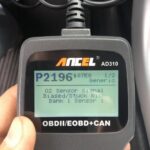Converting your vehicle to run on Compressed Natural Gas (CNG) can be a significant step towards reducing fuel costs and lowering your environmental impact. For those looking to delve into the world of CNG conversions, especially as a do-it-yourself project, online communities and forums become invaluable resources. Platforms like the Atiker Obd2 Forum (while perhaps not exclusively focused on CNG, forums discussing OBD2 and engine management often touch upon alternative fuel systems) serve as hubs for enthusiasts to share knowledge, experiences, and troubleshoot challenges.
Understanding the Basics of CNG Conversion
CNG conversion involves modifying your vehicle’s engine and fuel system to accommodate compressed natural gas as an alternative fuel to gasoline. The benefits of CNG are numerous: it’s domestically produced in many regions, often less expensive than gasoline, and burns cleaner, leading to reduced emissions and potentially longer engine life due to less carbon buildup and cleaner engine oil.
Considering the potential savings, let’s examine a hypothetical scenario, similar to a real-world example of a DIY conversion project:
Let’s assume you currently spend $55 per week on gasoline, based on 15 gallons at $3.67 per gallon. Annually, this amounts to a significant $2,860 in gasoline costs.
Switching to CNG, even with a slight decrease in fuel efficiency (around 10% typically), can lead to substantial savings. If CNG costs $1.85 per gasoline gallon equivalent (gge), and accounting for the 10% efficiency difference, your weekly CNG needs would be approximately 16.5 gge (15 gallons x 1.10). This translates to a weekly cost of $31 (16.5 gge x $1.85/gge), and an annual CNG fuel expense of $1,612.
Annual Gasoline Cost: $2,860
Annual CNG Cost: $1,612
Potential Annual Savings: $1,248
These figures highlight the compelling economic argument for CNG conversion, making it an attractive option for budget-conscious vehicle owners.
Budgeting for Your DIY CNG Conversion
For DIY enthusiasts, the initial investment in a CNG conversion system is a crucial consideration. Setting a realistic budget is key to a successful project. If you aim to recoup your investment within a reasonable timeframe, say 2.5 years, the target budget can be calculated based on your projected annual savings.
Using the $1,248 annual savings, over 2.5 years, the target budget would be around $3,120. Achieving this budget often necessitates taking the DIY route for installation, sourcing components strategically, and leveraging resources like online forums for guidance and cost-effective solutions.
Key Challenges and Considerations in CNG Conversion
Embarking on a CNG conversion project involves navigating several key aspects:
-
System Compatibility: Finding a CNG system that is compatible with your vehicle’s engine management system, particularly its Sequential Fuel Injection (SFI) system and OBD2 diagnostics, is paramount. Forums, including those that might discuss Atiker OBD2 systems or similar brands, can offer insights into system compatibility and potential integration challenges.
-
CNG Cylinder Selection and Safety: CNG cylinders, designed to withstand high pressure, come in various materials and sizes. They can be heavy and expensive, or lighter but even more costly. Cylinders also have expiration dates, requiring careful consideration of lifespan and sourcing options. Used cylinders might be available, but inspection and verification from reputable sources are crucial for safety. DOT certification is vital for ensuring cylinders meet safety standards for vehicle installation.
-
Refueling Infrastructure: Access to CNG refueling stations is a practical necessity. Fortunately, CNG refueling infrastructure is expanding in many areas. Online resources like the Alternative Fueling Station Locator can help identify stations in your vicinity. Home refueling stations are also an option, allowing you to compress natural gas directly from your home supply, although this adds to the initial system cost.
A DIY CNG Tank Installation Example
One crucial step in a CNG conversion is the secure and compliant mounting of the CNG cylinders. In a DIY project, such as on an FJ Cruiser with a robust frame, external mounting can be a practical approach. Utilizing the vehicle’s frame structure, especially in protected areas like under the rear, provides a solid base for cylinder installation.
Securely mounted CNG cylinders with protective shield, ready for integration into the vehicle’s fuel system.
Sourcing used cylinders from reputable dealers can help manage costs. In one example, a set of Type II cylinders with a remaining lifespan of five years was acquired for $550, plus shipping. These cylinders offered a balance of weight, price, and usable life.
Close-up of CNG cylinders showing robust construction and pressure rating, essential for safe CNG storage.
Fabricating Mounting Brackets and Ensuring Structural Integrity
Creating robust mounting brackets is critical to ensure the CNG cylinders are securely held and meet safety regulations. Regulations like NFPA 52 specify the strength requirements for fuel container racks, mandating they withstand forces multiple times the weight of the full container.
Custom fabricated steel bracket designed to securely mount CNG cylinders to the vehicle frame, meeting stringent safety standards.
DIY fabrication, using steel and welding, can significantly reduce costs compared to purchasing pre-made brackets. Ensuring the brackets are designed to support the weight of the cylinders when full, and using high-grade hardware, like 7/16″ grade 8 bolts, is essential for safety and compliance.
Detailed view of the fabricated bracket showing weld quality and robust construction, critical for withstanding vehicle stresses.
Bracket assembly ready for installation, illustrating the use of heavy-duty bolts and washers for secure mounting of CNG cylinders.
Close-up of a high-strength grade 8 bolt and washer used in the bracket assembly, ensuring reliable and safe cylinder mounting.
Forums as a Resource: Connecting with the CNG Conversion Community
For DIYers undertaking CNG conversion, online forums are more than just discussion boards; they are vital communities. While a dedicated “Atiker OBD2 forum” might be specifically centered around that brand’s diagnostic tools or systems, broader automotive forums, especially those focusing on alternative fuels or engine management, often contain threads and discussions relevant to CNG conversions. These platforms allow individuals to:
- Share Experiences: Learn from others who have completed similar conversions, gaining insights into best practices, potential pitfalls, and solutions.
- Seek Technical Advice: Pose questions and get guidance from experienced members on system selection, installation procedures, and troubleshooting.
- Discover Resources: Find recommendations for suppliers of CNG components, installers, and inspection services.
- Stay Updated: Keep abreast of the latest developments in CNG technology, regulations, and best practices.
While the journey of CNG conversion can be complex, the potential fuel savings and environmental benefits make it a worthwhile endeavor for many. By leveraging online communities and forums, and by carefully planning and executing each step, DIY enthusiasts can successfully convert their vehicles to CNG and join a growing movement towards alternative fuels.

